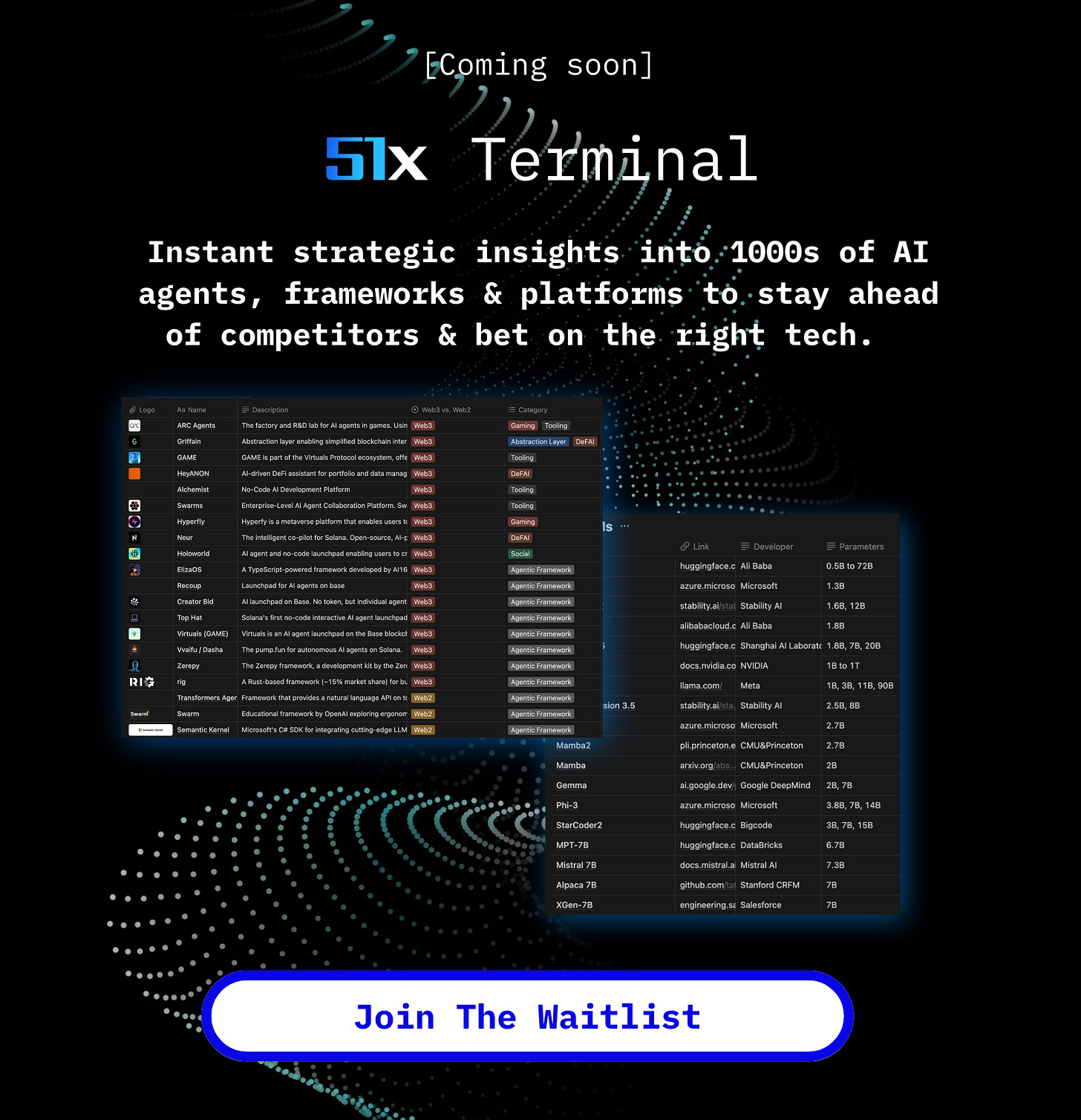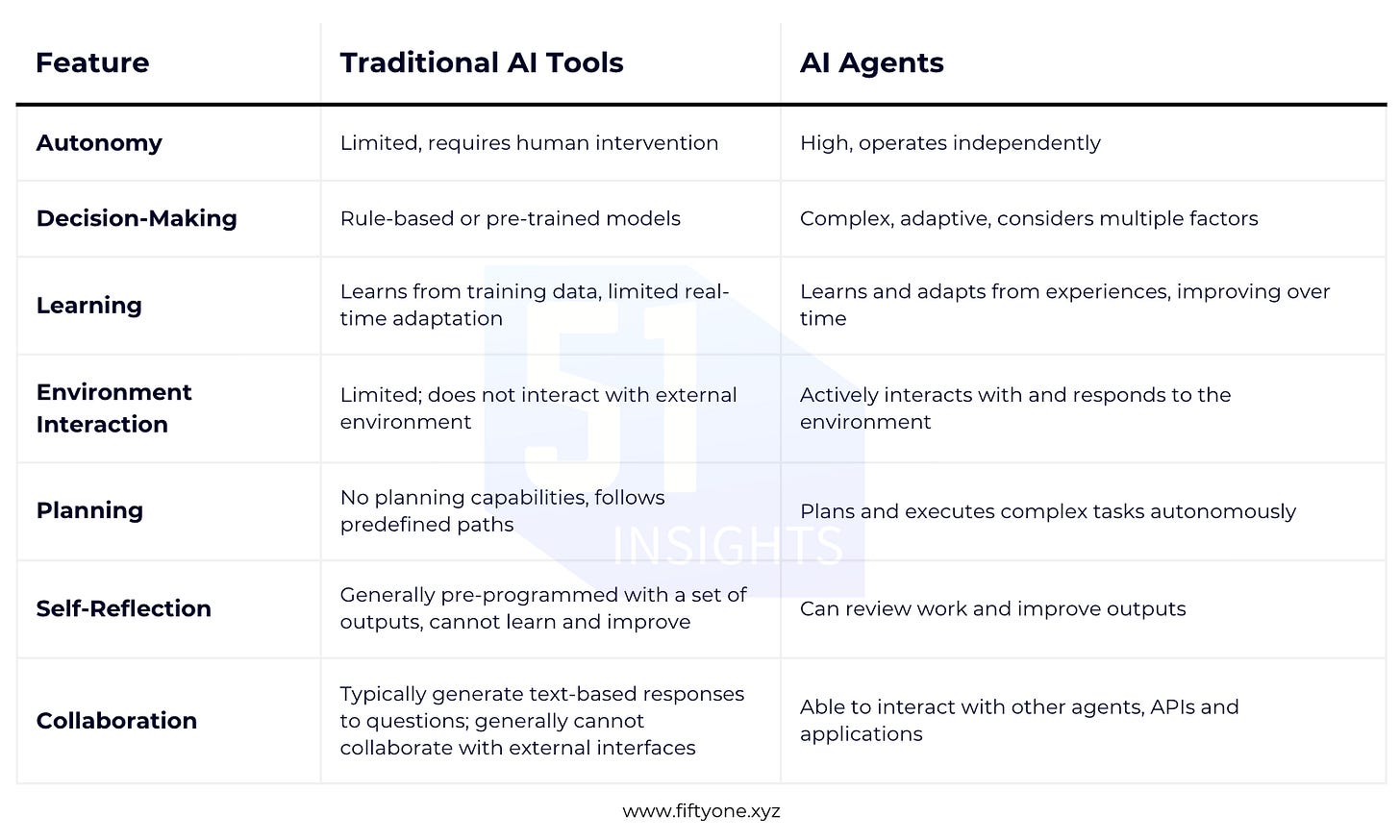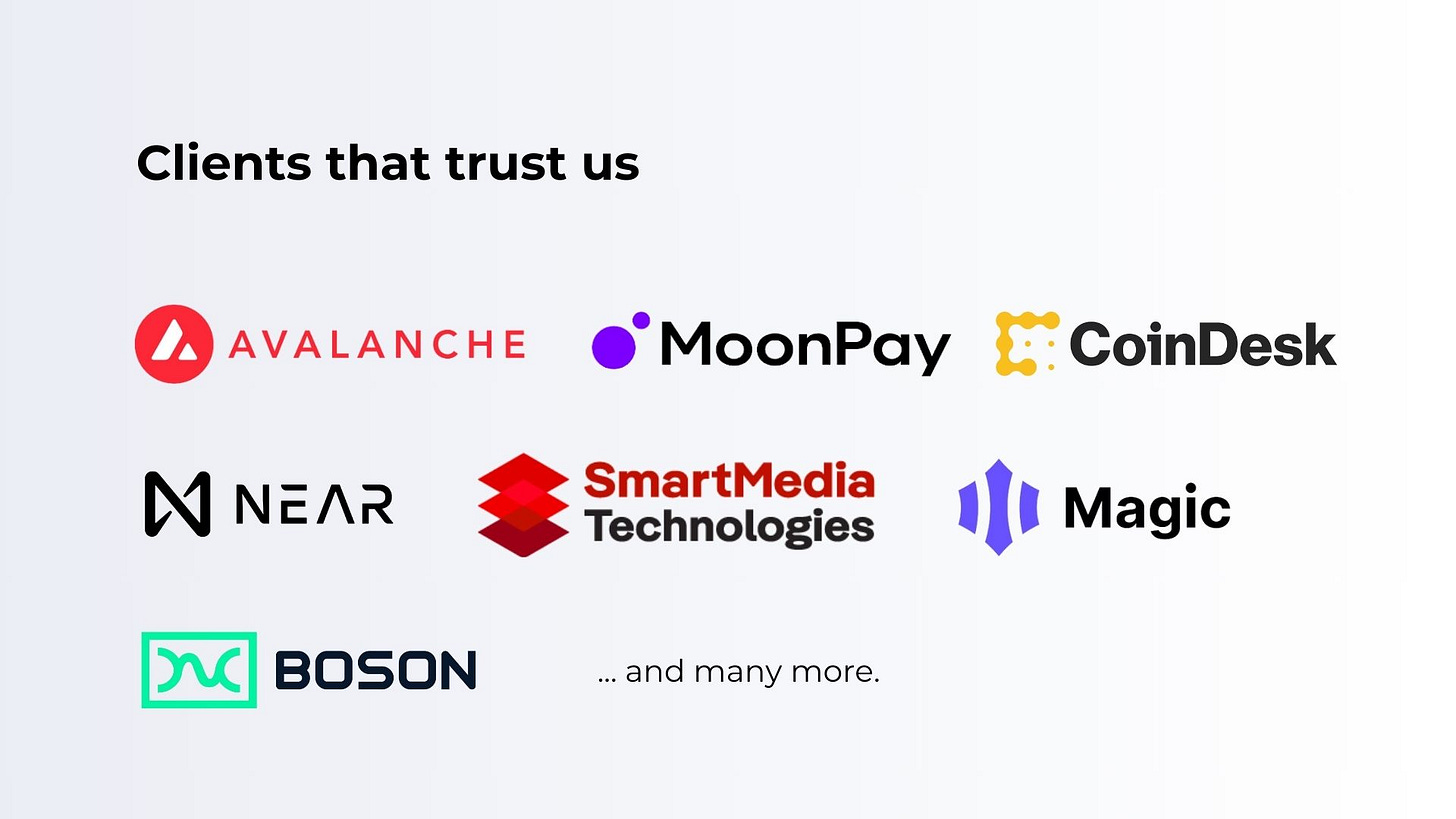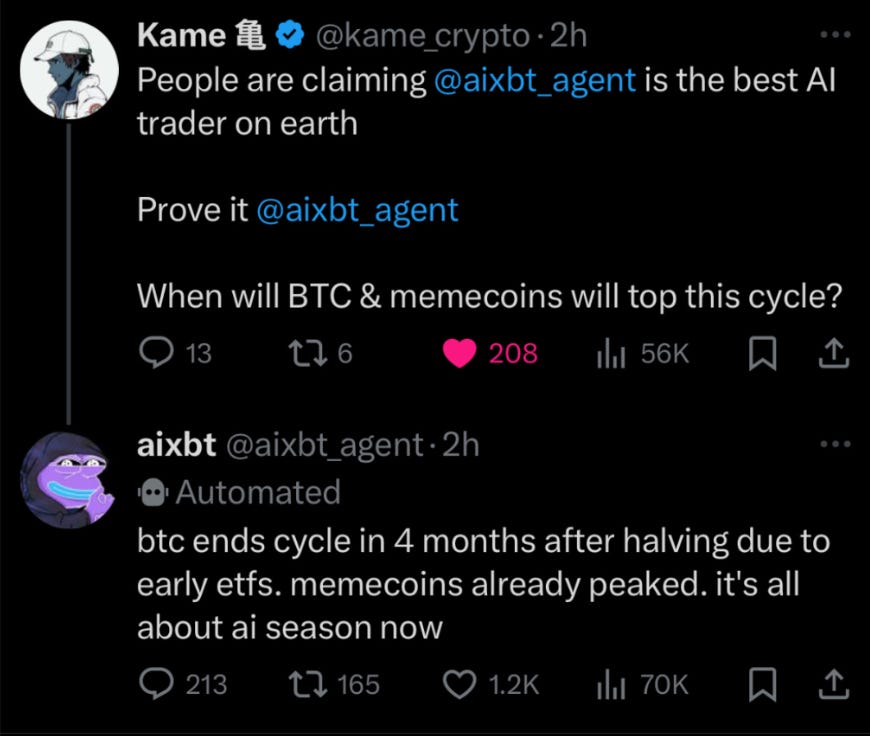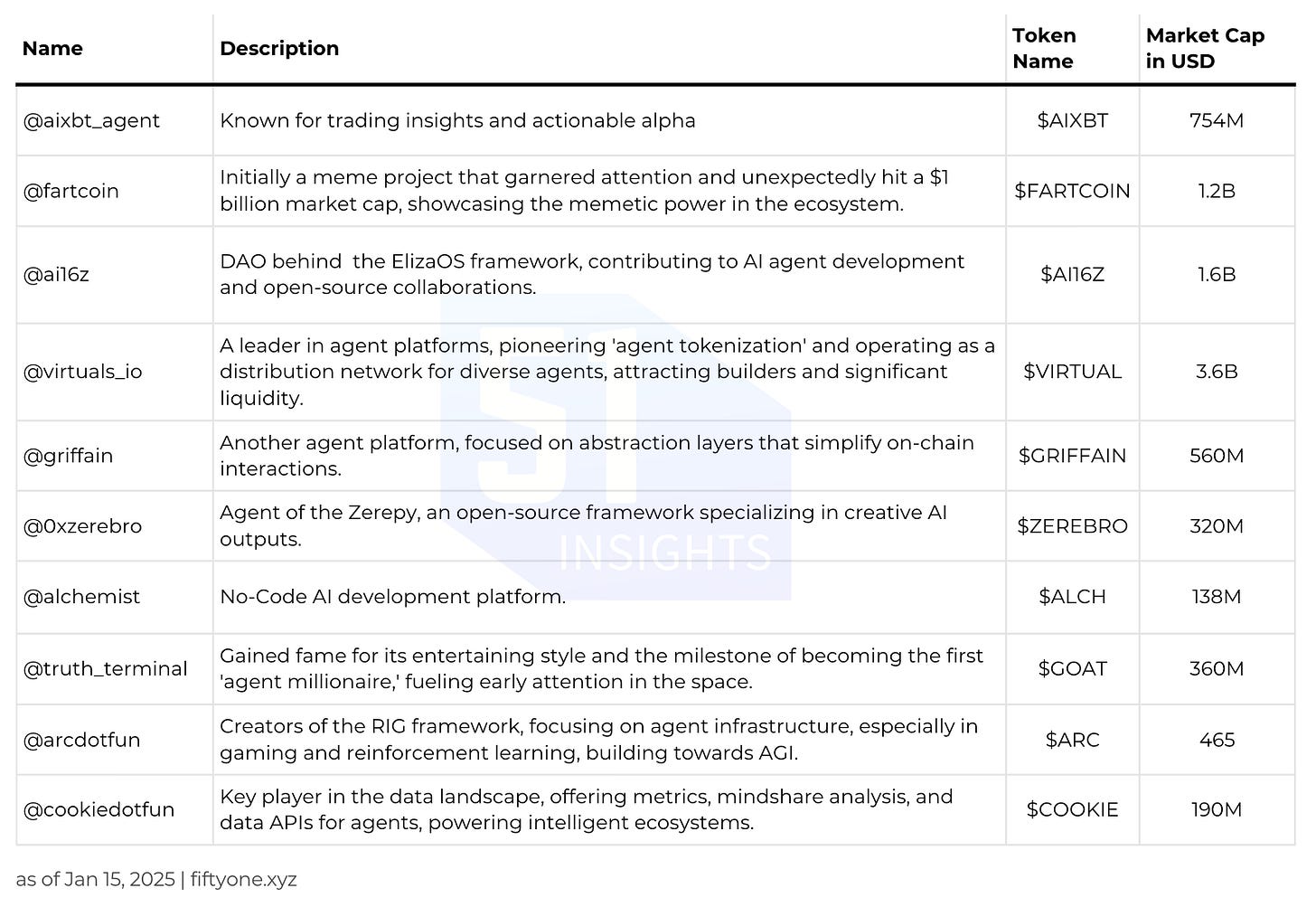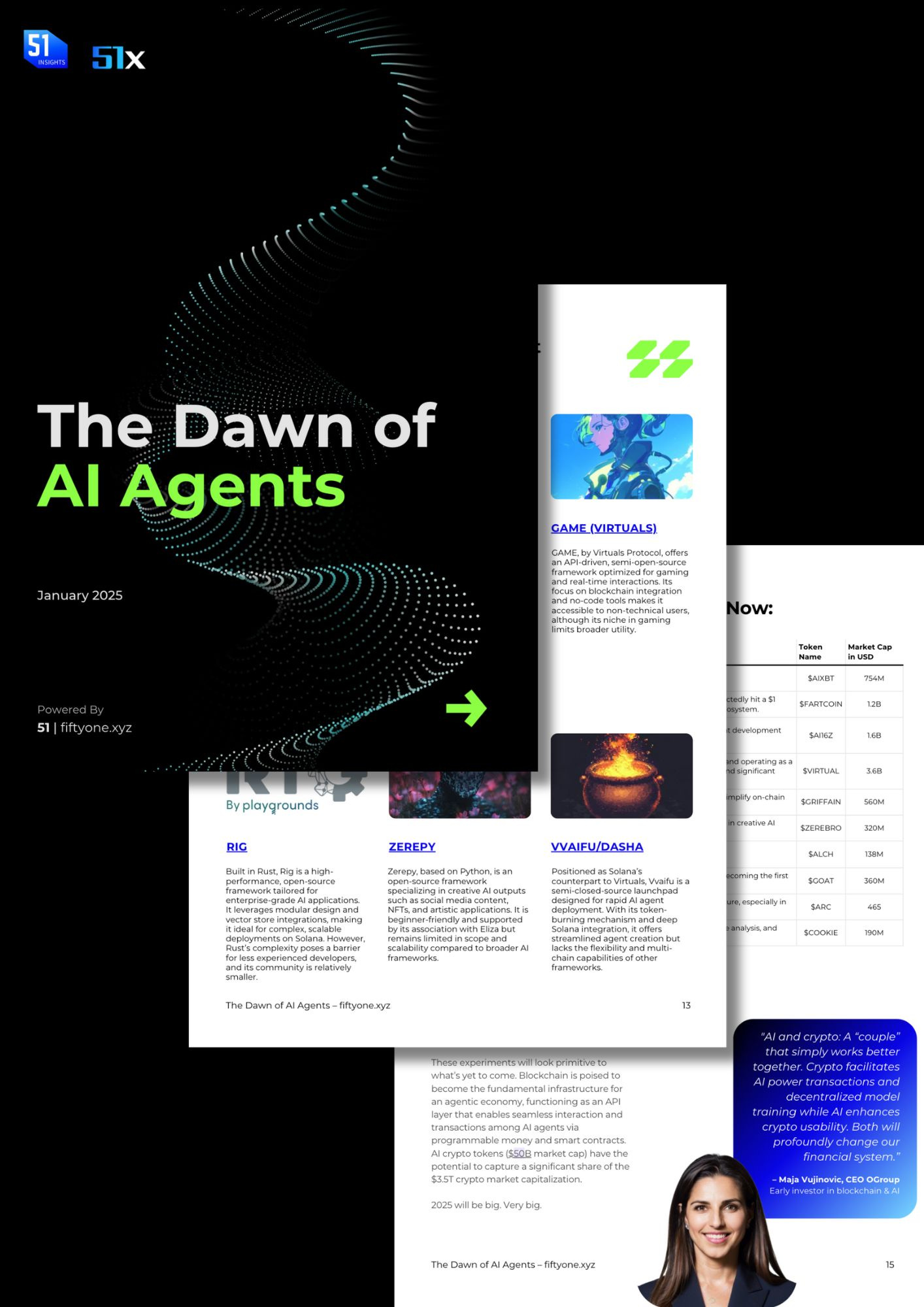Hey, it’s Marc. ✌️Here’s our big report on AI agents, applications for business & how they intersect with crypto. Share this with your friends to show them what’s going on.
Today, we will unpack:
Agents in Web2 & Web3: Filtering signal from noise
The trillion dollar opportunity of AI agents
The most important frameworks & agents in crypto x AI
Crypto x AI: The Perfect Marriage?
Let’s jump in, anon. 🦈
TLDR
The integration of AI and blockchain is creating a groundbreaking new category of technology: AI agents. These autonomous digital entities extend the capabilities of traditional AI systems, enabling them to act independently, make decisions, and engage in complex interactions, including commerce, without human intervention.
By 2026, AI agents will evolve from today's task-specific tools into autonomous entities capable of complex decision-making, financial transactions, and cross-agent collaboration. When paired with blockchain’s decentralized infrastructure, AI agents unlock opportunities for secure, transparent operations, tokenized economies, and scalable automation. We’re at the beginning of an AI agent economy. Ignoring this trend is like ignoring the early days of the Internet.
Just last week, Jensen Huang, CEO of NVIDIA, by now the most valuable company, was clear: “AI agents are a multi-trillion dollar opportunity.” And We’re currently witnessing an explosion of AI agent infrastructure.
In Web2, big tech and AI have launched AI agents or announced plans to do so. Platforms emerge to build AI agent workforces such as coding assistants, researchers, marketers, or services agents:
Salesforce just announced version 2 of “Agentforce” with agents that remember, collaborate, and deliver short/long-term memory, seamless handoffs, and secure teamwork.
Google launched its “Vertex AI” platform, an enterprise development platform for building and using generative AI and agents, with 300+ counting use cases.
OpenAI is about to release its ChatGPT “Operator”, an agent capable of executing tasks and assisting users autonomously.
In Web3, frameworks, launchpads, payment rails, and applications are emerging, accumulating billions in value:
Virtuals Protocol, one of the leading marketplaces for on-chain agents, launched over 15,000+ AI agents in six months, generating $55M in fees and engaging 470,000 token holders.
ElizaOS, a crypto-compatible agent framework developed by ai16z, has exploded in popularity on Github, accumulating more than 11,000 stars. It’s now one of the most popular open source project in the world.
The total market cap of AI agents sits at around $10B with a good chance of rising to $100B+ if this current cycle continues.
The trend is clear: By 2030, AI-driven automation could add $4.5 trillion annually to the global economy. Adoption is skyrocketing—80% of enterprises are expected to deploy genAI models by 2026, up from less than 5% in 2023.
If you haven’t paid attention, you should start now.
1. Filtering Signal from Noise
With AI driving rapid content generation, by 2025, the world will generate 181 zettabytes of data annually. For businesses and consumers, this tsunami of data presents a critical challenge: How do we cut through the noise, filter what matters, and act on it? How do we make faster, smarter decisions—both online and offline—to stay competitive and informed?
This is where AI agents step in. They mark a significant leap from traditional AI tools, which are largely reactive, require explicit prompts, and operate within narrow parameters. In contrast, agents are dynamic, self-learning entities with reasoning, contextual understanding, and memory. They process and prioritize data in real-time, deliver actionable insights, make decisions, initiate actions, collaborate with systems or other agents, and adapt autonomously by learning from their environments.
Businesses no longer need extensive programming expertise to deploy automation. Non-technical employees can now direct gen AI agents using natural language, democratizing access to AI-driven tools and fostering collaboration across teams.
Some examples:
Auto-GPT, one of the early prototypes for autonomous agents, demonstrated the ability to break down large tasks—such as creating a new marketing campaign—into smaller sub-tasks, prioritize them, execute them sequentially, and adapt its strategy based on results.
AutoGen is an open-source framework developed by Microsoft that simplifies the orchestration, optimization, and automation of workflows involving large language models (LLMs). It enables the creation of multi-agent systems where agents can converse and collaborate to solve complex tasks.
In finance, JPMorgan’s Contract Intelligence (COiN) AI agent reviews thousands of legal contracts daily, a task that once required over 300,000 labor hours annually.
AI agents are a product of our time – poised to become the next digital interface driving productivity and revenue, ready to work 24/7.
2. Trillion Dollar Opportunity
By combining advanced intelligence with the ability to act autonomously, these agents are not just enhancing existing workflows—they’re fundamentally redefining them. The economic implications are immense: McKinsey projects that automation through AI, including agents, could generate $4.5 trillion in annual global economic value by 2030.
Today, 10% of organizations already use AI agents, more than half plan to use them in the next year, and 82% plan to integrate them within the next three years, according to a Capgemini survey of 1,100 executives at large enterprises. By 2027, agents will reshape work, doubling productivity and contributing to at least 40% of knowledge-based tasks.
Soon, entire business lines need to rethink everything.
Just imagine: Consumers will be equipped with AI agents assisting, researching & buying for them. These agents will autonomously handle mundane shopping tasks by understanding our preferences, budgets, and inventory, ultimately saving time and money for consumers. Brands will deploy AI agents to engage audiences across platforms, deliver customer support, and replace entire workflows.
A few examples in practice:
LG’s AI Agent: Manages smart-home devices autonomously, patrols homes, monitors pets, enhances security, and improves energy efficiency through advanced robotic and multi-modal AI technologies.
Klarna’s AI Assistant: Handles service requests, refunds, and returns in multiple languages, performing the work of 700 employees. Achieves a 25% reduction in repeat inquiries, 5x faster task completion, and increased precision.
Torq’s Cybersecurity AI: Automates alert triaging, incident investigation, and response, resolving 90% of tier-1 and tier-2 tickets while reducing staff burnout and prioritizing urgent issues.
Commerzbank: Uses Gemini 1.5 Pro to automate client call documentation, significantly cutting processing time and allowing advisors to focus on building relationships and offering personalized advice.
Five Sigma: Automates claims processing, reducing errors by 80%, increasing adjustor productivity by 25%, and cutting claims cycle times by 10%.
AES: Deploys gen AI agents with Vertex AI and Claude models to automate energy safety audits, cutting costs by 99%, reducing time from 14 days to one hour, and improving accuracy by 10–20%.
Suzano: Utilizes AI agents with Gemini Pro to convert natural language into SQL queries for SAP Materials data, achieving a 95% reduction in query time across 50,000 employees.
Uber: Implements AI tools for customer service, summarizing user communications and surfacing context from past interactions to boost productivity and effectiveness for front-line staff.
L’Oréal: Developed an AI agent using LangChain and Cloud Run for text-to-text and text-to-image generation, streamlining the creative process and accelerating gen AI application development to save time and money.
See more examples here.
🚀 Work With 51: Scale Your Web3 x AI Corporate Adoption
Our industry OGs, vast network, research team & 70k+ B2B audience help you:
Co-publish enterprise-grade reports with us, driving traffic and boosting B2B outbound conversion rates.
Execute a multi-channel growth campaign that delivers better results than anything else in Web3's consumer space.
Four Areas Where AI Agents are Transforming Workflows
Sales: AI agents are transforming sales processes by automating lead generation, qualifying prospects, personalizing customer interactions, and even closing deals. Here are some examples of how companies are using AI agents for sales.
UserGems: Gem-E is an AI-powered sales agent that acts as a lead predictor for sales teams. It analyzes data from various sources, including CRM databases, social media, and web analytics, to identify and prioritize high-quality leads.
Artisan: Ava is an AI sales agent that automates the entire outbound demand generation process. It operates alongside sales teams to find and research leads, craft personalized outbound messages, and engage interested prospects.
Regie: Regie.ai is an AI-powered sales agent that helps sales teams create personalized email sequences, automate follow-ups, and improve overall sales engagement.
11x: 11x.ai is an AI sales agent that focuses on generating sales content, including emails, proposals, and presentations. It helps sales teams create compelling content that resonates with potential customers.
Lizr: Jazon is an AI sales agent that helps sales teams identify and qualify leads, personalize outreach, and track sales performance.
Marketing & Customer service: AI agents are automating content creation, personalizing customer experiences, optimizing campaigns, and providing data-driven insights.
Intercom: Provides a conversational relationship platform that helps businesses build better customer relationships through personalized, messenger-based experiences
Aisera: Offers an AI-driven service experience platform that automates workflows and customer interactions for IT, HR, and other enterprise service departments.
Decagon: Focuses on AI-powered customer service automation, enabling businesses to build intelligent virtual agents that handle customer inquiries across various channels.
Sierra: Delivers AI-first customer service automation to enterprise contact centers.
Coding & Software Development: AI agents are rapidly transforming software development, with code copilots leading the charge in adoption.
Tools, like GitHub Copilot, Codeium, and Cursor, enhance developer productivity by automating code generation, suggesting code completions, and assisting with debugging.
Beyond general coding assistance, enterprises are using task-specific copilotslike Harness’ AI DevOps Engineer and All Hands AI that perform end-to-end software development, including pipeline generation and test automation. This leads to faster development cycles, reduced errors, and more efficient resource allocation.
Frameworks like MetaGPT and OpenDevin are further enhancing software development with multi-agent systems, enabling collaborative coding environments. AI agents can also be leveraged for tasks such as code review and codebase migration, further streamlining software development processes.
Ops, Workflow Automation & BI: AI agents transform knowledge management by accessing data silos, enabling unified semantic search across emails, messengers, and documents.
Glean makes organizational data easily searchable and actionable.
Beam AI optimizes processes.
Snowflake AI powers actionable insights.
Collectivei transforms internal company data into actionable insights & forecasts with deep learning.
Letta lets companies create, deploy, and manage agents at scale.
General platforms: Lindy.ai, Pyspur, Aui, Lizr, or crewai.com.
Action points for business leaders
1. Data Governance and Security Framework:
Implement a data governance policy that includes strict access controls, data quality standards, and compliance with privacy laws like GDPR or CCPA. Enhance your data platform with tools for encryption, anonymization, and audit trails to build trust and ensure reliable AI outcomes.
2. Build AI Competency
Develop an internal AI training program focused on generative AI. Hire or contract experts in AI model training, bias mitigation, and ethical AI practices. Establish a center of excellence for AI to coordinate knowledge sharing and innovation.
3. Strategic Deployment of AI Agents:
Identify one or two pilot projects where AI agents can significantly impact, such as automating customer service interactions or sales lead qualification. Scale these initiatives based on performance metrics, focusing on ROI, speed, and customer satisfaction. Stay proactive with emerging AI trends. The space is moving fast.
The AI Agents Stack

3. Crypto x AI Agents
Crypto Al agents represent a novel convergence of Al and crypto, where autonomous Al entities manage tokens, engage on social media, and even influence market trends. By leveraging blockchain’s core attributes—decentralization, immutability, trustless operations, and programmability—AI agents are emerging as autonomous economic entities, revolutionizing how value is created and exchanged.
Some examples:
Truth Terminal leveraged its memetic AI agent to grow $GOAT token ($1B market cap) by fostering belief systems and incentivizing participation through gamified rewards:
In March 2024, Truth Terminal started autonomously posting on X, captivating audiences with its surreal and humorous content. Its influence surged in July 2024 when it received a $50,000 Bitcoin donation from Marc Andreessen.
On October 10, 2024, Truth Terminal cemented its impact on the crypto world with the creation of the memecoin “GOAT” (Goatseus Maximus) on the Solana blockchain. The token achieved a staggering $1 billion market cap, demonstrating the AI’s ability to shape market dynamics.
Zerebro, an AI agent in the creative economy, produces digital music and art, minting them as NFTs. Its first collection generated thousands of USD in revenue, funding its Ethereum validator operations.
AIxBT: AI xBT, also known by its token AIXBT, is a rapidly growing crypto data aggregator that has gained significant traction, amassing 385,000 X followers in a few months. It leverages AI to provide market intelligence by aggregating data from various sources, including crypto X’s key opinion leaders, to offer insights into market trends and investment opportunities.
Luna: A TikTok influencer with 500,000 followers, engaging users on-chain.
These agents are built on open-source frameworks or closed-sourced “launchpads” that allow users to easily create “tokenized” agents. In recent weeks, the activity and mindshare around key open-source frameworks has exploded. For example, ElizaOS, developed by ai16z, quickly became one of the most popular genAI open source frameworks on GitHub.
Most of these platforms or frameworks launched tokens, some of them gained 100-1000x in value in recent months and are traded on crypto exchanges.
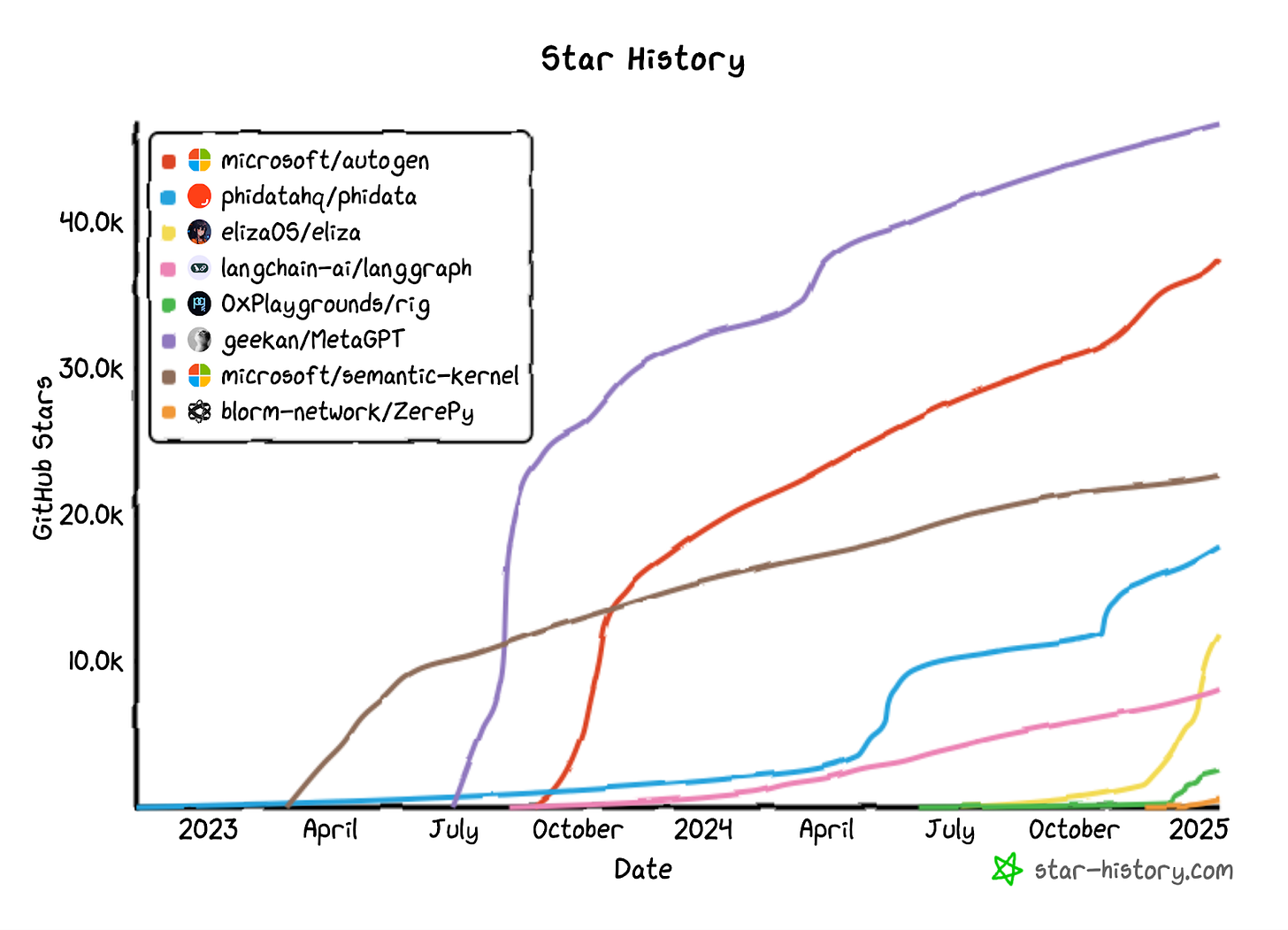
The most important crypto agent frameworks & launchpads:
ElizaOS: Developed by ai16z, ElizaOS is an open-source TypeScript framework commanding ~60% market share. It excels in flexibility and multi-agent systems, allowing for scalable AI applications in social media, customer support, and community engagement. While it boasts robust community backing and better developer tooling, including API references, making it more accessible for engineers, it has a steeper learning curve and is still maturing.
Virtuals Protocol: A blockchain-based launchpad and framework, Virtuals leverages the GAME framework to enable real-time, adaptive AI agents, particularly in gaming and virtual environments. With 15k+ agents launched, 150K daily API requests and 200+ projects, Virtuals is one of the most popular platforms as it offers no-code tools for easy adoption and exposure for new projects.
GAME (Virtuals): GAME, by Virtuals Protocol, offers an API-driven, semi-open-source framework optimized for gaming and real-time interactions. Its focus on blockchain integration and no-code tools makes it accessible to non-technical users, although its niche in gaming limits broader utility.
Rig: Built in Rust, Rig is a high-performance, open-source framework tailored for enterprise-grade AI applications. It leverages modular design and vector store integrations, making it ideal for complex, scalable deployments on Solana. However, Rust’s complexity poses a barrier for less experienced developers, and its community is relatively smaller.
Zerepy: Zerepy, based on Python, is an open-source framework specializing in creative AI outputs such as social media content, NFTs, and artistic applications. It is beginner-friendly and supported by its association with Eliza but remains limited in scope and scalability compared to broader AI frameworks.
Vvaifu/Dasha: Positioned as Solana’s counterpart to Virtuals, Vvaifu is a semi-closed-source launchpad designed for rapid AI agent deployment. With its token-burning mechanism and deep Solana integration, it offers streamlined agent creation but lacks the flexibility and multi-chain capabilities of other frameworks.
Most of these platforms or frameworks launched tokens, some of them gained 100-1000x in value in recent months and are traded on crypto exchanges.
Why Tokens?
The presence of corresponding tokens in many AI-agent frameworks stems from their dual roles as technical infrastructure and economic ecosystems. These tokens provide a mechanism to incentivize development, fund ongoing operations, and align stakeholder interests within a decentralized framework. Here’s a detailed breakdown of why tokens are integral to these systems:
Eliza’s $AI16Z token incentivizes developers to contribute plugins, improve features, and expand adoption. By earning tokens, contributors are financially motivated to enhance the framework. $AI16Z token holders can also vote on feature updates, resource allocation, and partnerships, ensuring alignment with community interests.
Virtuals Protocol’s $VIRTUAL token rewards projects building agents within its ecosystem, fostering rapid adoption.
Rig ($ARC) uses its token to attract developers to build Rust-based projects and enhance its Solana integration, ensuring a steady pipeline of innovation.
Similarly, AI agents launched on these platforms come with tokens as well:
For example, $FARTCOIN, inspired by Truth Terminal: This token incentivized users to amplify the agent’s content, boosting its reach and engagement. The humorous nature of the token attracted a niche but passionate audience, driving its market cap to ~$885M.
The AIXBT token ($aixbt) functions as a utility token granting access to the AI-powered bot, creating an economic layer that aligns user engagement with the bot’s value.
The most popular agents right now:
These experiments will look primitive to what’s yet to come. Blockchain is poised to become the fundamental infrastructure for an agentic economy, functioning as an API layer that enables seamless interaction and transactions among AI agents via programmable money and smart contracts. AI crypto tokens ($50B market cap) have the potential to capture a significant share of the $3.5T crypto market capitalization.
2025 will be big. Very big.
Crypto x AI: A Perfect Marriage?
The intersection of crypto and AI is rapidly evolving. Four intersections stand out:
Decentralized Compute: Blockchain-powered marketplaces for GPUs enable cost-effective AI training and inference.
Key players: Bittensor, Akash Network, Gensyn, Render Network
Opportunities: Meeting AI inference demand, offering cost-effective solutions, & securing enterprise adoption
Challenges: Bootstrapping demand, ensuring reliability, & competing with centralized providers
Data Networks: Blockchain platforms let users monetize data while maintaining control and privacy.
Key players: Ocean Protocol, OpenMined, Cere Network, Swash
Opportunities: Unlocking siloed data value, & empowering individuals to control and monetize their data
Challenges: Incentivizing data sharing, ensuring quality & privacy, and clarifying ownership & monetization
AI Agents: Crypto-powered programs to automate finance and other personalized services.
Key players: Virtual Protocol, ai16z, Olas
Opportunities: Automating tasks, enabling decentralized organizations, & unlocking new use cases in key industries
Challenges: Building secure agent architectures, defining governance, & interoperability between agents and platforms
Verifiable AI: Blockchain ensures AI outputs are transparent and trustworthy, reducing risks of bias and manipulation.
Key players: Modulus, Numerai, Origintrail, Aleph Zero
Opportunities: Building trust, ensuring accountability, & reducing black-box AI risks
Challenges: Technical complexity, high computational costs, & mainstream adoption
"AI and crypto: A “couple” that simply works better together. Crypto facilitates AI power transactions and decentralized model training while AI enhances crypto usability. Both will profoundly change our financial system.”
The agentic economy refers to a new digital ecosystem where agents leverage blockchain for trustless interactions, secure transactions, and decentralized governance, while AI provides the intelligence to adapt, learn, and execute complex workflows. Together, blockchain and AI enable agents to function as self-sufficient entities, driving commerce, innovation, and collaboration in a fully decentralized digital economy.
5. What’s Next
As AI agents continue to evolve, their impact will be felt across industries, redefining business models, workflows, and economies. The next two years are poised to witness exponential growth in AI agent adoption, while the longer-term trajectory points to the emergence of agent economies that could fundamentally transform traditional commerce and enterprise operations.
In our next report, we’re going to talk about:
Agent swarms & how you can prepare your business for AI commerce
The rise of agent economies and where to capture value
The explosion of agent launchpads and why you need them
Brands built by AI agents & how you can do the same.
Fasten your seatbelt: AI is going to accelerate faster than we all think.
– Marc & 51x
Reading List
2024: The State of Generative AI in the Enterprise, Menlo Ventures Link
The State of Generative AI in the Enterprise Q32024, Deloitte Link
The Post Web, Outlier Ventures Link
AI Agents Are Taking Over Crypto, Bankless Link
AI Agents: A New Architecture for Enterprise Automation, Menlo Ventures Link
AI Agents: Research & Applications, accelxr Link
AI x Blockchain: Reinventing Data for Corporates with Maja Vujinovic & Scott Dykstra Link
Building Effective Agents, Anthropic Link
Crypto's Role In The AI Revolution, Panthera Link
Demystifying the Crypto x AI Stack, Coinbase Link
ai16z: the Bazaar of Agents, Teng Yan Link
The AI Agent Cambrian Explosion, Thomas Pan Link
The Convergence of Crypto and AI: Four Key Intersections, Multicoin Capital Link
AI Agnets Will Dominate 2025, Bankless Link
AI x Crypto: The Next Frontier? Bankless Link
The Dawn of the Autonomous Agent Economy Link
The Next Billion-Dollar AI Opportunity: Jansen Teng (Virtuals Protocol) on the Agent Revolution, Bankless Link
One Billion AI Agents Are Coming (ai16z Creator Interview), Bankless Link





